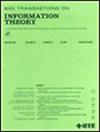On the Price of Decentralization in Decentralized Detection
IF 2.2
3区 计算机科学
Q3 COMPUTER SCIENCE, INFORMATION SYSTEMS
引用次数: 0
Abstract
Fundamental limits on the error probabilities of a family of decentralized detection algorithms (e.g., the social learning rule proposed by Lalitha et al., 2018) over directed graphs are investigated. In decentralized detection, a network of nodes locally exchanging information about the samples they observe with their neighbors to collectively infer the underlying unknown hypothesis. Each node in the network weighs the messages received from its neighbors to form its private belief and only requires knowledge of the data generating distribution of its observation. In this work, it is first shown that while the original social learning rule of Lalitha et al., 2018 achieves asymptotically vanishing error probabilities as the number of samples tends to infinity, it suffers a gap in the achievable error exponent compared to the centralized case. The gap is due to the network imbalance caused by the local weights that each node chooses to weigh the messages received from its neighbors. To close this gap, a modified learning rule is proposed and shown to achieve error exponents as large as those in the centralized setup. This implies that there is essentially no first-order penalty caused by decentralization in the exponentially decaying rate of error probabilities. To elucidate the price of decentralization, further analysis on the higher-order asymptotics of the error probability is conducted. It turns out that the price is at most a constant multiplicative factor in the error probability, equivalent to an研究了有向图上分散检测算法系列(如 Lalitha 等人提出的社会学习规则,2018 年)错误概率的基本限制。在去中心化检测中,节点网络会在本地与邻居交换关于它们观察到的样本的信息,从而共同推断出底层的未知假设。网络中的每个节点都会权衡从邻居那里收到的信息,从而形成自己的私有信念,并且只需要知道其观测数据的生成分布。在这项工作中,首先证明了虽然 Lalitha 等人,2018 年的原始社会学习规则在样本数量趋于无穷大时实现了渐近消失的错误概率,但与集中式情况相比,它在可实现的错误指数上存在差距。造成这种差距的原因是,每个节点都会选择局部权重来权衡从邻居那里接收到的信息,从而导致网络不平衡。为了缩小这一差距,我们提出了一种修改后的学习规则,并证明它能达到与集中式设置一样大的误差指数。这意味着,在错误概率的指数衰减率中,分散化基本上不会造成一阶惩罚。为了阐明分散化的代价,我们对误差概率的高阶渐近线进行了进一步分析。结果发现,代价最多是错误概率的一个乘法常数,相当于错误指数的一个 $o(1/t)$ 加法差距,其中 t 是网络中每个代理观察到的样本数和信息交换轮数。这个常数取决于网络的连通性,并反映了网络失衡的程度。文中展示了支持我们的学习规则的错误概率模拟结果。此外,还介绍了进一步的讨论和结果扩展。
本文章由计算机程序翻译,如有差异,请以英文原文为准。
求助全文
约1分钟内获得全文
求助全文
来源期刊

IEEE Transactions on Information Theory
工程技术-工程:电子与电气
CiteScore
5.70
自引率
20.00%
发文量
514
审稿时长
12 months
期刊介绍:
The IEEE Transactions on Information Theory is a journal that publishes theoretical and experimental papers concerned with the transmission, processing, and utilization of information. The boundaries of acceptable subject matter are intentionally not sharply delimited. Rather, it is hoped that as the focus of research activity changes, a flexible policy will permit this Transactions to follow suit. Current appropriate topics are best reflected by recent Tables of Contents; they are summarized in the titles of editorial areas that appear on the inside front cover.
 求助内容:
求助内容: 应助结果提醒方式:
应助结果提醒方式:


